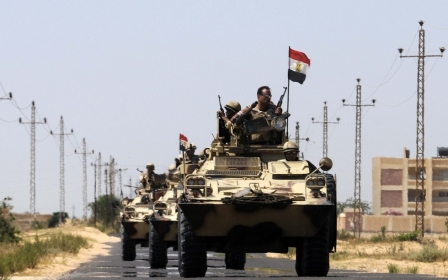Founder of Sinai branch of Islamic State killed in air strike: Egyptian army

A founding member of the Sinai branch of the Islamic State (IS) group was killed in a recent air strike, the Egyptian army confirmed on Sunday.
Abu Anas el-Ansari, died following injuries sustained in an air strike on 18 March that killed 18 militants and injured several others, army spokesperson Tamer el-Refai wrote in an official statement released on Facebook on Sunday.
IS had already announced Ansari's death in its latest issue of the propaganda magazine Al-Nabaa.
The army spokesperson identified Abu Anas el-Ansari, who used the nom de guerre Salem Salma el-Hamdeen, as one of the most important figures in the northern Sinai-based group and as one of the founders of Ansar Beit al-Maqdis, the Egyptian militant group that in November 2014 pledged allegiance to IS and re-named itself "Islamic State - Sinai Province".
Abu Ansari was in charge of the supply of arms and weapons, the Egyptian army said in the statement.
Ansari's role had not been detailed in the obituary published by IS in Al-Nabaa. However, IS propaganda praised him as one of the earliest supporters of IS in Sinai after the proclamation of its self-styled caliphate in June 2014.
He had been a member of an al-Qaeda-inspired group known as "Al Tawhid wal Jihad," an organisation that claimed responsibility for deadly bombings targeting tourists in Egypt's Red Sea resorts between 2004 and 2006.
New MEE newsletter: Jerusalem Dispatch
Sign up to get the latest insights and analysis on Israel-Palestine, alongside Turkey Unpacked and other MEE newsletters
Middle East Eye delivers independent and unrivalled coverage and analysis of the Middle East, North Africa and beyond. To learn more about republishing this content and the associated fees, please fill out this form. More about MEE can be found here.





